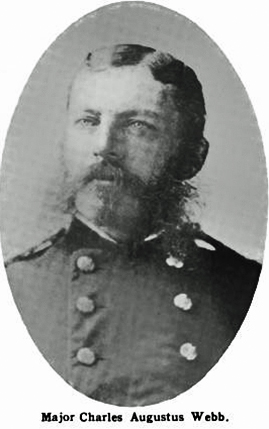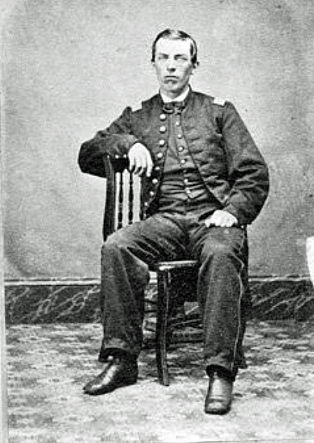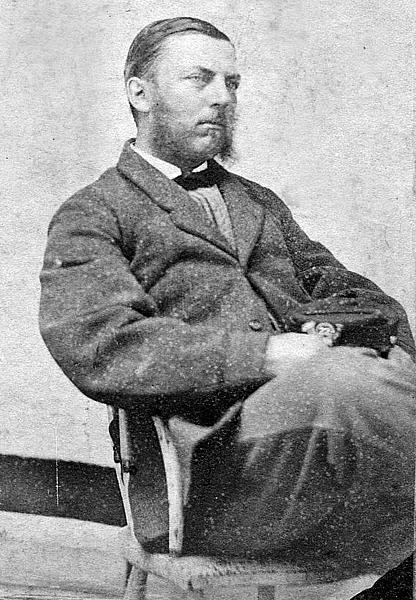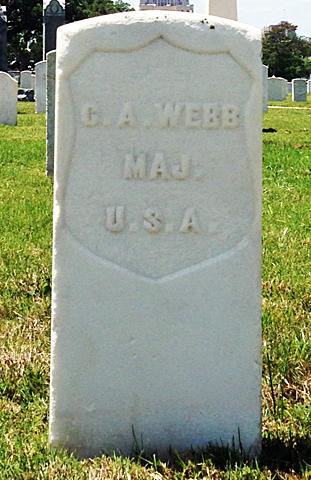![]() 1st Battalion 22nd Infantry
1st Battalion 22nd Infantry ![]()
Captain Charles A. Webb
22nd Infantry 1866-1879

Charles Augustus Webb was born
in Montpelier, Vermont on December 29, 1838.
When he was ten years old his family moved to Northfield,
Vermont. While growing up in Northfield,
he received an excellent education, first in the public schools,
then at Northfield Academy,
then at Thetford Academy in the nearby town of Thetford, and
finally to high school at
Black River Academy in Ludlow, Vermont.
Webb entered Norwich University
in Northfield, Vermont, in 1860. Norwich is the oldest private
military college
in the United States, and is officially recognized by the
Department of Defense as the Birthplace of R.O.T.C.
He was still attending the University when war broke out in April
of 1861, and on May 9, 1861,
was commissioned a 1st Lieutenant in Company F of the 1st Vermont
Infantry.

1st Lieutenant Charles A. Webb
Photo taken of Webb as a newly commissioned 1st Lieutenant
of Company F (Northfield Company) of the 1st Vermont Infantry
Regiment
May-August 1861
Photo from the Vermont Historical Society website
The following letter was written
by Charles Webb to his father, the day after Webb, as a young 1st
Lieutenant,
took part in the Battle of Big Bethel, in Hampton and York
County, Virginia, June 10, 1861 (known as the battle of Bethel
Church
to the Confederates). He was with Company F of the 1st Vermont
Infantry, also known as the Northfield Company.
In the letter Webb mentions an incident of friendly fire by
"Germans".
The "Germans" were
troops of the 7th New York Infantry Regiment, which had been
recruited from mostly
German immigrants and descendants of German immigrants in New
York City. A column from the 3rd New York Infantry,
commanded by Colonel Frederick Townsend, was moving to join them,
and was led by the Brigade Commander's staff,
who were mounted on horseback. The 7th New York, under Colonel
John E. Bendix, had been alerted that there was
Confederate cavalry opposing them in the area, and in the dark of
night mistook the friendly column for the enemy.
LAMOILLE NEWSDEALER: JUNE 21, 1861
A LETTER FROM LIEUT. WEBB, OF THE NORTHFIELD COMPANY
CAMP BUTLER: NEWPORT NEWS, VA.
JUNE 11, 1861
DEAR FATHER: --- Night before last, at 7 p.m., I was thinking that perhaps my last letter to you would be my last. At 7 our Company, with four others from the Vermont Regiment, had orders to be ready to march at 12 that night, with forty rounds of cartridges. We started from this camp with 600 German, 250 Vermont, and 250 Massachusetts troops. Under orders we marched nine miles without stopping. We were to meet two Regiments from Fortress Monroe, at a point eight miles from our camp. But when we arrived they were not there; so we marched on and went about two miles beyond. We heard heavy firing of artillery and musketry, and supposed that our artillery and rear guard of 600 Germans had been attacked by the rebels. We then countermarched back two miles on the run, formed the line of battle and charged on them. But we soon found that they were part of our own forces that had come from the Fortress to act in concert with us, who the Germans thought were Secessionists, and pitched into them accordingly --- killing three, and wounding three or four of Colonel Townsend's Regiment. The firing made us four miles of extra marching, besides giving the enemy warning of our coming. We then marched some four or five miles, when we were overtaken by Col. Townsend and Col. Duryee's Regiments, making in all about twenty-five hundred men. If we had gone directly to the place we started for, we should have done very much better. We were under the command of Brigadier General Pierce. We marched up to within seven-hundred yards of the enemy's entrenchments and formed three lines. Col. Duryee's Zouaves made charge, followed by Col. Townsend's Regiment, while we were posted for a short time, as a researve in rear of the whole. The rebels were sending their shells in among us at the rate of one per minute --- bursting in all directions; but none of us were hit, until the order came to charge.
I will describe the place before I go any farther. Bethel Meeting House is the name of the place. It is twelve miles from this camp, and eight miles from Yorktown (where the rebels have a very large force), and four miles from Hampton. The firing between our two regiments (Townsend's and the Germans) enabled them to signal across the river to send over to Yorktown for reinforcements; when if we had gone straight ahead we should have surprised and taken the whole of them, for as I before said, we were posted in the rear for a while. Afterwards we had orders to form on the right flank of the Zouaves, where the balls whistle some, I can tell you. Afterwards we were ordered farther to the right where there was no firing, nor did the rebels expect any. The result was that they (the rebels) received some five hundred balls among them, and the majority of them told, too. We kept up fire for about half an hour, when the call for retreat was sounded, and we were obliged to heed it. We retired from the field for the want of more men and artillery. We had only two cannon and two small howitzers, while the enemy must have had a battery of ten to fifteen guns besides a rifled cannon which did fearful execution among our troops, and about three thousand men, as near as we could judge. So you will see by the above that five companies of the First Vermont Regiment have been under fire, and did not flinch a particle. At least the Northfield did not, I know, for I was with them all the time. The Woodstock, Bradford, Northfield, Burlington and Rutland were the companies detailed for the Bethel expedition. The Rutland and Burlington were detailed as skirmishers, and did not have a chance to fire a shot, but the shot whistled over their heads pretty freely. One of our men, Robert Coffey, by name, fainted away before we went into action. He had not been very well all day; and having to march twelve miles, and run three, it tuckered some of them out. We left Coffey in care of the surgeon, and started for the scene of action; got almost there, when we had to leave the Captain--- not because he was afraid, by any means, but running and marching so far was to much for a man of his flesh. We started again, and another man (Larabee) gave-out with sun stroke. We left Second Lieutenant Gove to get him to the rear, and I took the rest of our men on.
I never saw hail stones any thicker than the balls were about our heads. We did not have a man hit, but some I should judge had a rather narrow escape, by the holes in their coolers. We have one man missing; he was last seen about five miles this side of the battlefield. He must have got mixed up with the troops that went to the fort. The Woodstock and Burlington companies have each one man missing in the same way. Two of the Bradford and two of the Woodstock men were wounded --- not any of them very badly. The men are all tired and footsore after their thirty-five miles march of yesterday. There are but very few of them but are around without any boots, and with very tender feet. They do not feel very well satisfied with the fight of yesterday; they are anxious to try it again. I tell you that you had better believe it is a tough place, facing an enemy when the balls are flying so thick as hail stones. After the first volley we did not think of the balls coming to us, but how we could best send balls to them. I think by tomorrow there will be another force sent out to rout them. Our troops were fired on from a house and the ball just grazed the leg of Orderly Sweet of the Woodstock Company. The smoke from the gun had not any more than cleared away before he was a prisoner, and his house (a very beautiful one, by the way) was in flames. The man proved to be Lieut. Whiting, Adjutant of a rebel regiment. We took five other prisoners, about forty bridles, thirty knives, and a host of other things. I am so tired I cannot write much more. There were wounded and killed about forty on our side; we must have killed seventy-five or one-hundred of their men. The entrenchment was completely surrounded by trees and bushes, except on the side where we were firing. The man we cannot find is John Buxton. We were repulsed for the want of men and artillery; 3000 men not covered against 3000 entrenched, with fifteen pieces of cannon, is most to much.
YOUR OBEDIENT SON,
Chas. A. Webb ¹
Webb's service
with the 1st Vermont only lasted a few months, as, on August 5,
1861 he was offered a commission
in the newly re-constituted 13th United States Infantry. He was
honorably mustered out of the Vermont Infantry
on August 15, 1861, and accepted the federal position on October
7 of that year, entering the US Army
with the rank of Captain, assigned to 2nd Battalion 13th
Infantry, his date of rank going back to August 5, 1861.
He was awarded a Brevet rank of
Major on July 4, 1863, for
"gallantry and meritorious service in the seige of
Vicksburg, Mississippi."
This battle is where the 13th Infantry earned its motto
"First At Vicksburg".
Beginning in April of 1864, the
13th Infantry was detailed as special guard at Major General
William T. Sherman's
headquarters near Nashville, Tennessee. It would remain at
Edgefield, near Nashville, through the end of the war.
In June of 1866 the 13th
Infantry was stationed on the frontier, in the Dakota Territory.
On September 21, 1866,
in the Army reorganization of that year, the 2nd Battalion of the
13th Infantry became the 22nd Infantry Regiment.
Webb was officially transferred to the 22nd Infantry and became one of the Regiment's first officers in its newly formed existence.
The Annual Reports to the
Secretary of War for 1870 showed Webb in charge of a Company of
the 22nd
on duty in the Dakota Territory:
Whetstone agency, Dakota Territory
Commanding officer: Capt. C.A. Webb, 22d Inf.
Number of companies: 1
Regiment: 22d Inf.
Commissioned officers: 4
Enlisted men: 126
Aggregate: 130
The Annual Reports to the
Secretary of War for 1871 showed Webb still in charge of a
Company of the 22nd
in the Dakota Territory, though its size had been severly
reduced:
Whetstone agency, Dakota Territory
Commanding officer: Capt. C.A. Webb, 22d Inf.
Number of companies: 1
Regiment: 22d Inf.
Commissioned officers: 3
Enlisted men: 54
Aggregate: 57
The Annual Reports to the
Secretary of War for 1876 showed Webb in charge of a Company of
the 22nd
on duty in Michigan:
Fort Brady, Michigan: At Sault Ste.
Marie, Michigan.
Commanding officer: Capt. Charles A. Webb, 22d Inf.
Regiment: 22d Inf.
Number of Companies: 1
Commissioned officers: 4
Enlisted men: 40
Aggregate: 44
In 1877 Webb was stationed at Fort Mackinac, Michigan.
On March 4, 1879 Charles Webb
was promoted to Major and transfered to the 16th Infantry,
serving at Forts in the Department of the Missouri and the
Department of Texas.
Attesting to the hardships of
life on the frontier in those times, he died of pneumonia
at Fort McKavett, Texas on January 31, 1882, at the age of 44.
Webb's Army career had lasted 21 years, 13 of which he served with the 22nd Infantry.

The above photo is
inscribed July 31, 1868 Fort Sully, Dakota Territory.
It shows Charles A. Webb as a Captain with the 22nd Infantry. The
kepi he is holding in his lap has the large bullion looped horn
insignia
for Infantry worn by officers 1866-1875, with the number 22 in
the horn's loop, for the 22nd Infantry. His sky blue trousers
have the
wide dark blue stripe worn by infantry officers 1851-1884. His
coat is a private purchase item, and together with his shirt and
tie arrangment,
suggest an informal setting. This is the oldest dated photograph,
named to a specific location, of an identified 22nd Infantry
Officer.
The 1st Battalion website is grateful to Mark Krausz, who graciously shared this item of great historical significance with us.
**********************
The following biography of
Charles Webb was written by William Arba Ellis, and published in
1911
in a book about distinguished graduates and students of Norwich
University. The 1st Battalion website
could not confirm the statement that Webb commanded a company at
the Battle of Bull Run as noted
in this biography. Neither the 1st Vermont nor the 13th US
Infantry was present at either Battle of Bull Run.
Also in the biography is a
reference to "General Cook", which actually should read
"General Crook".
Webb's service as mentioned in the biography, "in the Indian
warfares, 1866-75" and at Forts Wayne, Brady,
and Mackinac, was all done while he was a member of the 22nd
Infantry.
Charles A. Webb, son of Edward Augustus and Mary
Ann (Wainwright) Webb, was born in Montpelier, Vt., December 29,
1838,
and died of pneumonia at Fort McKavett, Texas, January 31, 1882;
was buried in San Antonio, Texas. In 1848, his parents removed
to Northfield, where he attended the public schools, the
Northfield Academy, also the Thetford (Vt.) Academy and Black
River
Academy, Ludlow, Vt. He entered the University in 1860, taking a
special course in Military Drill and Tactics, remaining until
1861.
On the breaking out of the Civil War, he offered
his services to the State, and was commissioned 1st lieutenant
Company F,
1st Vermont Infantry; was mustered out of service, August 15,
1861; was promoted captain 13th U.S. Infantry, August 5, 1861;
transferred to the 22d United States Infantry, September 21,
1866; major, 16th United States Infantry, March 4, 1879; was
brevetted major, U. S. A., July 4, 1863, for "gallant and
meritorious service at the seige of Vicksburg, Miss."
At the battle of Bull Run, he commanded his
company; was on recruiting service in Toledo, Ohio, and in
Indianapolis, 1862-63;
was stationed at Hunstville, Ala., 1864; Camp Sherman, near
Nashville Tenn., 1864-65; Jefferson Barracks, Mo., 1865;
Fort Leavanworth, Kans., 1865-66. In 1866, the 13th regiment was
consolidated with the 22d Regiment and he was assigned
to General Cook's command for frontier service. He served in the
Indian warfares, 1866-75, enduring the hardships of border life;
was stationed at Forts Wayne, Brady and Mackinac, Mich., 1875-79;
Fort Gibson, Indian Territory and Fort Riley, Kans.,
in 1879. He performed conspicuous service during the Ute uprising
in Colorado, during 1879-80; was stationed at Fort Stockton,
Texas, 1880 and at Fort McKavett, Texas, 1881-82.
He was an officer of kind and generous impulses;
one who loved his profession and striving to do his best in it;
was ever conscientious and energetic in the discharge of any duty
that might be devolved upon him.
He was married December 12, 1878, to Mrs. Rose
(Truscott) Disbrow of Mackinac Island, Mich., who survives him
and resides at Mackinac Island, Mich. One child was born to them,
Mabel Macia, born September 1, 1881, married J. Dallas Dort,
and resides in Flint, Mich.
William Arba Ellis, Norwich University 1819-1911; Her History, Her Graduates, Her Roll of Honor, v. 2, (Capital City Press, Montpelier, 1911), pp. 661-662.
**********************
Charles Augustus Webb is buried
in the San Antonio National Cemetery,
San Antonio, Bexar County, Texas, Plot: A, 153

Grave marker for Charles A. Webb
Photo by Laura T. from the Find A Grave website
¹ From the Vermont in the Civil War website
Sources:
HISTORY of the THIRTEENTH REGIMENT UNITED
STATES INFANTRY
by U.G. McALEXANDER, Captain, Adjutant, 13th Infantry
Published by the Regiment 1905
OFFICIAL ARMY REGISTER's for 1861 through 1882
ANNUAL REPORTS TO THE SECRETARY OF WAR 1870, 1871, 1876
VERMONT IN THE CIVIL WAR. A HISTORY OF THE PART
TAKEN BY THE
VERMONT SOLDIERS AND SAILORS IN THE WAR FOR THE UNION,
1861-5.VOLUME 1
By G G. BENEDICT.
BURLINGTON, VT : THE FREE PRESS ASSOCIATION.1886
Home | Photos | Battles & History | Current |
Rosters & Reports | Medal of Honor | Killed
in Action |
Personnel Locator | Commanders | Station
List | Campaigns |
Honors | Insignia & Memorabilia | 4-42
Artillery | Taps |
What's New | Editorial | Links |